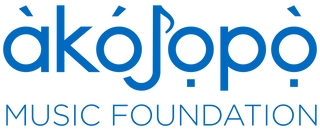
Welcome to Akojopo Blog's new interview series about African art music! Every month, we hope to deliver content that helps readers who are unfamiliar with the world of African art music to know more through interviews with musicians, composers, music educators, musicologists, and arts administrators. Our goal through documenting and sharing knowledge of African art music professionals is that this series will lead to increased professional exposure and new musical collaborations, giving way to a truly Pan-African art music landscape. If you have any questions, comments, or would like to be interviewed for an upcoming Interview Series blog post, please contact us at publishing@akojopo.org and we will get back to you soon!
Biography: For our inaugural Interview Series blog post, we interviewed Jonatan Carrasco, a composer based in Mexico. He is an eclectic composer who creates a wide range of music compositions; from tonal pieces to music that uses technology to manipulate sound in real time. His piece Incantation was premiered in our concert series on July 22nd, 2023, at the Musical Society of Nigeria (MUSON) Center.

Incantation composed by Jonathan Carrasco - view music score
-
How would you define "African art music"?
-
It's a little complicated, but I would say it is art music rooted in any of the musical traditions from any country on the African continent. This also includes the diaspora, who have musical traditions rooted in their experiences of the continent that they took with them. For example, here in, we have people that have migrated to the United States and still take their traditions with them there. While these traditions are not quite the same, they have been adapted to fit new circumstances and cultural materials. Just like how we have more varieties of maize (corn) in Mexico, while in the US there are fewer types, and yet we still can make the same foods but with different materials because the cultural roots of the cooking are still the same. This applies to everyone else who migrates; their roots are still the same.
-
 Benemérita Universidad Autónoma de Puebla
Benemérita Universidad Autónoma de Puebla
-
What are your musical practices? How many years have you pursued music?
-
I'm mainly a composer but I'm also a guitarist and a teacher. I find that I don't have as much time to play guitar because of my teaching, so I prefer to dedicate my time to composing. I teach music at all levels, from grade school to the university. The university I work at is called Benemérita Universidad Autónoma de Puebla (Meritorious Autonomous University of Puebla), one of the top five universities in Mexico.
-
I have pursued music for over thirty years, since the 1980s. I first started playing flute as a child and began studying music more seriously in 1998.
-
What is your background and how does it inspire your musical practices?
-
I actually didn't come from a family of musicians but some family members did play recreationally. My grandfather played guitar some, but I never saw him play because he died when I was young. My father had a keyboard but never played it seriously; he used it like a toy more than anything else. I am the youngest of four boys, so one of my older brothers started learning the keyboard but he wasn't serious. Another one of my brothers played guitar but he wasn't serious either. I guess all of these experiences from my family took hold in me, inspiring my love of music where my other family members did not take it seriously.

La Musique Est Un Jeu D'Enfants by Francois Delalande
-
Who are your artistic teachers/mentors and what did you learn from them?
-
When I was a child learning flute, my teacher was a man named Angel. He helped start my love of music. My guitar teacher from high school is my mentor though. His name is Manuel Espinas. He helped me believe that I could be a good musician. It was because of him that I decided to study music. We are now colleagues working at the same university. I also learned from Gonzalo Macias, who taught me composition.
-
What music teaching methods do you use?
-
A book that has helped form my teaching methods is called La Musique Est Un Jeu D'Enfants by Francois Delalande. Delalande said that young children are natural composers, so we just have to let them experiment with sounds and the ways that they produce them; it is a process of self-discovery. These ideas can be adapted to any student that is studying music. So with a few guidelines, we should allow our students to explore music by practicing, listening to their ideas, and discover new sounds they like. For example, listening to rock music can inspire new ideas for 12 tone music study and so on.
-
Are there any groups/organizations that have helped to sponsor your music development (including churches and religious institutions)?
-
Akojopo Music Foundation has sponsored my music development, particularly with African art music. I had to go back and study African music to be able to create Incantation for the 2023 concert. Also my university Benemérita Universidad Autónoma de Puebla (Meritorious Autonomous University of Puebla) has sponsored many formative opportunities for me. In 2006, I performed with the university's theater company in France. I composed for the theater production and also was a musician in it. My university also sent me to Argentina for an exchange program where I taught for a year. I also composed music for an ensemble in Korea called Neue Musik aus Korea (NMK), who sponsored the creation of new music for them. Lastly, the Puebla City Government has sponsored me by commissioning an opera for soprano and electronic sounds, which will premiere in October 2025 by the soprano Angélica Luna Tapia, who is also the author of the story and lyrics of the opera. The grant for the program is called Incentives for Artistic and Cultural Innovation by the Instituto Municipal de Arte y Cultura (IMAC)
-
What types of music influence your musical practices?
-
If I can say anything about my music tastes, I'm eclectic. I have a lot of musical influences. I'm heavily inspired by the music that my mom used to play around the house, a lot of popular music meant for dancing like boleros or cha cha and so on. Her love of rock and roll inspires me as well. From my dad, he listened a lot to the big band music of Glenn Miller. I personally like atonal music, experimental music, and noisy music. John Cage, Arnold Schoenberg, and Karlheinz Stockhausen are big inspirations of mine. From my project with Akojopo, I've delved more into African rhythms and regularly use those for other compositions. I've also been inspired by Mexican composers such as Javier Alvarez, Mario Lavista, Arturo Márquez, Gabriel Ortiz, Enrico Chapella, and others. I also teach using classical composers, so Bach, Beethoven, Mozart, etc.
-
What instruments do you use in your music practices? Do you use African instruments?
-
I mainly use strings and brass instruments as an orchestral composer. I compose for guitar because it's my personal instrument. I write music for singers too. Lastly, I write music that incorporates a lot of pre-Hispanic indigenous Mexican instruments such as the jaguar whistle, and other traditional instruments as the marimba chiapaneca or others from elsewhere in the world.
-
In what ways do you see the art music industry changing for African art music?
-
Before learning about Akojopo, I didn't know that there was such a thing as African art music but I see things changing for the better every day. For example, in the United States, all Latin American music traditions get attached to the Spanish music tradition and we sometimes forget to think narrowly and understand differences. Also, in Mexico, some people may mistakenly say that Korean, Japanese, and Chinese music traditions are Asian music tradition without looking at each music culture and its specificities. I see the same issue for African art music, where those without knowledge will look at the term as it connects the whole continent instead of thinking of specific countries and cultures. On the other hand, it is a good term to think about the similarities in music-making across the entire continent
-
What careers/hobbies/pursuits do you have outside of your musical practice? How do they inform your musical practice?
-
I really love reading and watching films. Some of my favorite traditional writers are Isaac Asimov, and Arthur C. Clark. I also like Colombian writer Gabriel Garcia Marquez, and Japanese writer Haruki Murakami. For movies, I like art films and international films, lesser known movies. I like Mexican films too.
-
Why do you continue to pursue music?
-
I pursue music because, to me, music is life. Music is all around me and it grabbed my interest when I was young. If not for music, I wouldn't have been able to travel or study abroad either. So I see music as something that has helped me in life and continues to enrich me positively.
-
How do you feel about the concept of Pan-Africanism? What does it mean to you?
-
I like the term better than just "Africa" because it causes us to think about how the African continent is made up of 54 countries and has many diasporas. It forces me to think about the beautiful geographical and cultural diversity of the continent. It also allows me to consider the African diaspora that we have here in Mexico and how their music traditions have influenced the music culture that we have.

